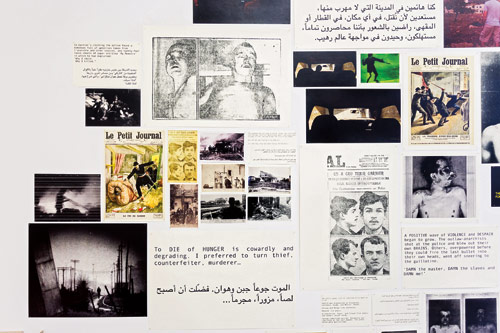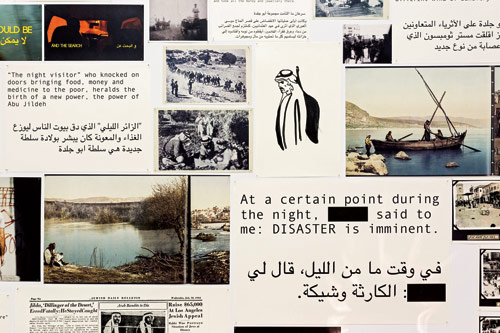Part 1 & Part 2
2012-ongoing
Basel Abbas and Ruanne Abou-Rahme

Basel Abbas and Ruanne Abou-Rahme’s The Incidental Insurgents is a two-part installation that offers a multi-layered narrative, engaging with the crisis of contemporary politics and the potential for a new social imaginary to emerge out of its collapse. The installation consists of images, texts, objects, sounds and video materials that, together, constitute an investigation into possibilities for the future based on literary and factual texts. The first part, in two chapters, combines four stories: the early anarchist life of Victor Serge and his bandits in 1910s Paris; Abu Jilda and Arameet and their bandit gang involved in a rebellion against the British in 1930s Palestine; the artist as the quintessential bandit in Roberto Bolaño’s novel The Savage Detectives (1998), set in 1970s Mexico; and Abbas and Abou-Rahme themselves in present-day Palestine. This section looks at the resonance between these inspiring and sometimes tragic stories of outsider rebels often dismissed as mere criminals and excluded from the roll call of revolutionary struggle.

The second part of the work looks at the metamorphosis of these incidental figures (Serge, Bolaño or the artists themselves) or the resonance of their final gestures years after they have been killed (Serge’s Bonnot Gang, Abu Jilda) by following them, who are somehow forgotten. In doing so, the work seeks to refuse the apparent ‘permanence’ of a capitalist-colonial present – and unfold a recurrent impulse of refusal, one that, though defeated many times, continues to resurge and return. One recurring element in the second part of the narrative is a Palestinian publishing house. Established by the father of one of the artists, it served as an informal meeting point in Jerusalem for several of the political factions at the time, from the Palestinian Communist Party to Matzpen – a revolutionary organisation founded in 1962, mostly by Israelis and some Palestinians, that viewed Zionism as a colonising project. – GE